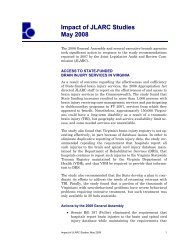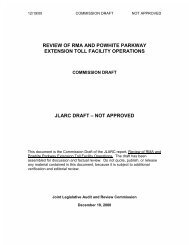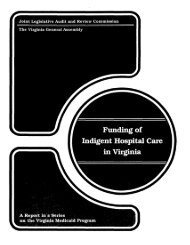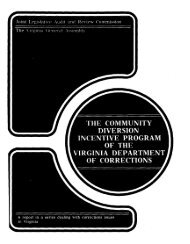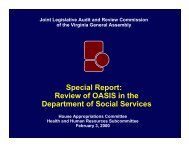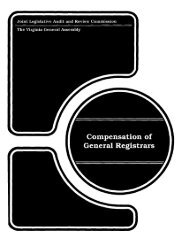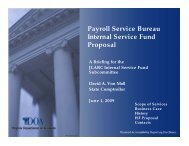Funding of Constitutional Officers - Virginia Joint Legislative Audit ...
Funding of Constitutional Officers - Virginia Joint Legislative Audit ...
Funding of Constitutional Officers - Virginia Joint Legislative Audit ...
Create successful ePaper yourself
Turn your PDF publications into a flip-book with our unique Google optimized e-Paper software.
that found in state agencies. Requests for reimbursement which are<br />
made for non-budgeted items are not allowed. Consequently, State<br />
funds are expended only for the specific purpose for which they were<br />
originally bUdgeted. The Compensation Board bUdgets by category<br />
(e.g., <strong>of</strong>fice expenses, capital outlay, part-time employment, etc.)<br />
and, after review, allows <strong>of</strong>ficers to transfer funds between<br />
categories. This process allows constitutional <strong>of</strong>ficers to fiscally<br />
manage their <strong>of</strong>fice and respond to changing priorities. A block<br />
grant approval would provide a lump sum dollar amount to the <strong>of</strong>fice<br />
to be expended for any purpose.<br />
The current Compensation Board appropriation for administration<br />
is $436,670; all other programs (i.e., funds going to constitutional<br />
<strong>of</strong>ficers) total $267,662,709, for an administrative overhead ratio<br />
<strong>of</strong> 1:613. It is doubtful if any grant program providing aid to<br />
localities has an equal or smaller ratio.<br />
WE AGREE that ability to pay, or fiscal stress, should be<br />
considered for funding <strong>of</strong> non-personnel costs, provided that total<br />
need is considered.<br />
Recommendation (6). The General Assembly may wish to consider<br />
establishing State and local shares for funding <strong>of</strong> the<br />
constitutional <strong>of</strong>ficers based on assignments <strong>of</strong> cost responsibility<br />
and local ability to pay. Cost responsibility can be based on the<br />
criteria developed for this study. Ability to pay can be based on<br />
an index <strong>of</strong> relative revenue capacity.<br />
WE<br />
AGREE with reservations.<br />
The Compensation Board clearly recognizes that there are<br />
functions performed by constitutional <strong>of</strong>ficers which inure to the<br />
benefit <strong>of</strong> the locality. The costs <strong>of</strong> these functions should be<br />
borne by the locality.<br />
The Compensation Board believes that the method to determine<br />
whether duties are a shared responsibility is a helpful guide. We<br />
question the method <strong>of</strong> assigning cost. The percentage allocation <strong>of</strong><br />
duties between State and Local responsibilities is a major element<br />
<strong>of</strong> the staff's recommendations. The Compensation Board believes a<br />
detailed review <strong>of</strong> these percentages is necessary to be sure <strong>of</strong> an<br />
equitable distribution <strong>of</strong> funding. This allocation should not only<br />
consider who benefits from the service, but more importantly the<br />
basis <strong>of</strong> the requirement. These allocations should compare the<br />
staff's results with existing funding formulas. To base the<br />
percentage allocation solely on who benefits, ignores that there are<br />
services which indirectly serve the Commonwealth.<br />
One factor not considered by the JLARC staff is the ability <strong>of</strong><br />
local law enforcement agencies to write traffic tickets on a state<br />
or local ordinance. If the locality adopts the state traffic code<br />
as a local ordinance, revenue from fines imposed goes to the<br />
locality. As demands on local governments increase for funding,<br />
more localities will employ this option.<br />
89




